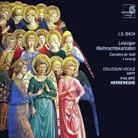December 2004
The music contained in this two-disc set was written in 1723 and 1724, when Bach moved to Leipzig to become Kantor. The Magnificat and Cantata No. 63 were both played on Christmas Day of 1723. Each was scored for substantial forces, including an orchestra comprising oboes, bassoon, trumpets, and timpani, in addition to the usual strings and organ. In the alto aria of the Magnificat, two recorders are required. The early version of the Magnificat is not the one we usually hear. That one is a later reworking in D Major. This one is in E Flat and contains four movements specifically for Christmas Day that were dropped from the later version. The three cantatas that Bach wrote for the three feast days of Christmas 1724 are not as grand as the Magnificat. They are introspective and darker in tone, with texts that are contemplative. Still, the beginning of Cantata 91 is quite dramatic, scored with horns and timpani in the orchestra. Its bustling figuration reminds one of the First Brandenburg Concerto. But the chorale that closes this work is straightforward and plain, the opposite of the remarkable, highly adorned chorale that closes Cantata 63. That one runs over six minutes and features virtuoso orchestral interludes of almost wild abandon. Except for conductor Herreweghe, the performers on these recordings are largely unknown. But they are superb, to a man or woman. I was especially impressed with bass Sebastian Noack, who brings grace and fluidity to the Magnificat’s "Quia fecit mihi magna." In the same work, tenor Mark Padmore manages both heroic and lyric sounds in the "Deposuit potentes." Sopranos Carolyn Sampson (Magnificat and Cantata 63) and Dorothee Blotzky-Mields bring clear tone and lucid enunciation to their work, while contralto Ingeborg Danz is simply beyond reproach. It is no surprise that the choral singing is crisp and clear, since the Collegium Vocale Gent is a small chorus, numbering from 16 to 18 singers. What is pleasantly surprising is the rich, full-bodied sound it produces. The orchestral players are first-rate and sound world-class whether playing solo or ensemble passages. Conductor Philippe Herreweghe seems to have the full measure of this music in every bone in his body. There is not a misjudged tempo or dynamic anywhere and he secures tight ensemble playing to boot. The SACD multichannel re-mix is a little odd on paper in that the center channel is used much as the rear channels are normally employed, for front ambience. In actual listening, this helps create a singular feeling of stage depth, with the chorus clearly in place behind the instruments. Dynamic and frequency range seem just right, and advanced resolution allows every nuance to be heard with ease. The 42-page booklet contains good notes and all the texts and translations for each work. Buying this set seems a glorious way to celebrate the holiday season. GO BACK TO: |
 Bach - Christmas
Cantatas from Leipzig
Bach - Christmas
Cantatas from Leipzig